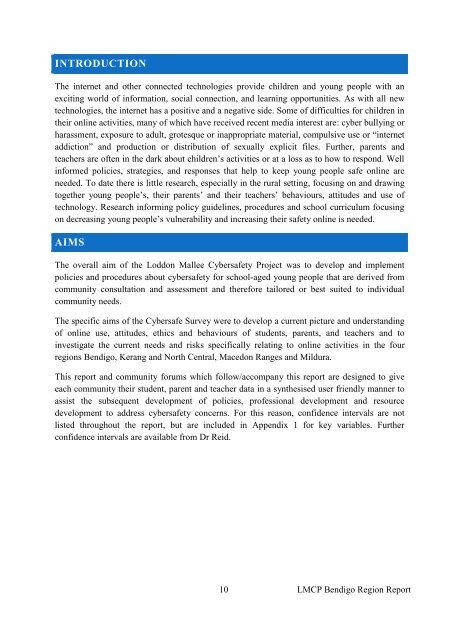LODDON MALLEE - Cyber Safe Kids
LODDON MALLEE - Cyber Safe Kids
LODDON MALLEE - Cyber Safe Kids
You also want an ePaper? Increase the reach of your titles
YUMPU automatically turns print PDFs into web optimized ePapers that Google loves.
INTRODUCTION<br />
The internet and other connected technologies provide children and young people with an<br />
exciting world of information, social connection, and learning opportunities. As with all new<br />
technologies, the internet has a positive and a negative side. Some of difficulties for children in<br />
their online activities, many of which have received recent media interest are: cyber bullying or<br />
harassment, exposure to adult, grotesque or inappropriate material, compulsive use or “internet<br />
addiction” and production or distribution of sexually explicit files. Further, parents and<br />
teachers are often in the dark about children‟s activities or at a loss as to how to respond. Well<br />
informed policies, strategies, and responses that help to keep young people safe online are<br />
needed. To date there is little research, especially in the rural setting, focusing on and drawing<br />
together young people‟s, their parents‟ and their teachers‟ behaviours, attitudes and use of<br />
technology. Research informing policy guidelines, procedures and school curriculum focusing<br />
on decreasing young people‟s vulnerability and increasing their safety online is needed.<br />
AIMS<br />
The overall aim of the Loddon Mallee <strong>Cyber</strong>safety Project was to develop and implement<br />
policies and procedures about cybersafety for school-aged young people that are derived from<br />
community consultation and assessment and therefore tailored or best suited to individual<br />
community needs.<br />
The specific aims of the <strong>Cyber</strong>safe Survey were to develop a current picture and understanding<br />
of online use, attitudes, ethics and behaviours of students, parents, and teachers and to<br />
investigate the current needs and risks specifically relating to online activities in the four<br />
regions Bendigo, Kerang and North Central, Macedon Ranges and Mildura.<br />
This report and community forums which follow/accompany this report are designed to give<br />
each community their student, parent and teacher data in a synthesised user friendly manner to<br />
assist the subsequent development of policies, professional development and resource<br />
development to address cybersafety concerns. For this reason, confidence intervals are not<br />
listed throughout the report, but are included in Appendix 1 for key variables. Further<br />
confidence intervals are available from Dr Reid.<br />
10 LMCP Bendigo Region Report


